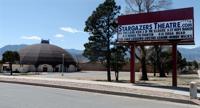A merry band of acoustic musicians have itchy fingers at Treehouse Cafe on Colorado Springs’ north side.
They come bearing guitars, one fiddle, some sheet music and a yen to fill their Saturday morning with a good old-fashioned bluegrass and Americana jam session. It’s one of the many jams offered throughout the month under the umbrella of the Black Rose Acoustic Society, a nonprofit celebrating its 30th anniversary.
Group leader Kelly Hagerman kicks things off with “Fox on the Run” — “An oldie but a goodie,” he tells the three other guitarists, including Bob Ucman, who started playing nine years ago when he was 60, and now leads his beginner and intermediate bluegrass jam twice a month at Calvary United Methodist Church. Sure, maybe he doesn’t hit every note correctly, he says, but it doesn’t matter.
“Any sound you make is music,” Ucman said. “You just have to figure out how it fits. When I can’t figure out the chord progression, I just become a snare drum.”
He demonstrates making a percussive sound on his guitar, its neck bedazzled with dangling feathers.
“I’m a half measure behind you guys,” he says later during a song.
“It happens,” says Katie Champlin-Hagerman, a late addition who pitches in with the honeyed sounds of her fiddle.
Halfway through the two-hour jam, guitarist Danny Cuevas leads a rollicking rendition of “(Get Your Kicks on) Route 66.” Each of the musicians melds their chords and voices to the mix, the energy of their circle vibrating throughout the coffee shop and encircling the other patrons, one who sits back at his two-top with his beverage, tapping his fingers on the table.
BRAS was born in the early 1990s out of a group of local musicians who shared a love for acoustic music, what BRAS board emeritus Bob Lord describes as music played on traditional front porch instruments, such as guitars, mandolins, fiddles and double basses, that weren’t electronically amplified.
They would gather at each other’s homes around the city and dream of finding a central place to meet.
The vision was finally realized in 1994 when musicians Charlie Hall, Hope Grietzer and Murry Stewart held an event at the Black Forest Community Center and invited anyone who wanted to play acoustic music. That was the night BRAS was born. And the following year the organization held its first concert at the large, cozy log cabin in the middle of the forest.
BRAS filled a niche in the community. as there was nowhere at the time to get together and play music with people, Grietzer says.
“It opened up a world of community and connection, making music with people and learning old tunes from centuries ago and new ones still being composed today in the traditional genre,” Grietzer said from Ithaca, N.Y., where she now lives. “It was intergenerational. It didn’t matter what your socioeconomic level was or your political motives. Nothing matters with music. It’s a global uniter.”
Since then the all-volunteer organization has welcomed hundreds of nationally known musicians to its stage, including Roger McGuinn, Ricky Skaggs & Kentucky Thunder, Mason Williams, Karla Bonoff, Chris Thile, John McCutcheon, Tom Rush, Tom Paxton, Tommy Emmanuel, Beppe Gambetta, The Blue Canyon Boys, The Rifters and Bill Hearne.
“We only do 21 shows a year,” Lord said. “Because of that our booking guidelines are strict. We’re pretty fussy about who we allow on stage. We want to keep the quality up and keep ourselves entertained.”
Throughout the decades, BRAS has slid into all corners of the Pikes Peak region, sustaining itself through ticket sales, memberships and donors. Many mistakenly assume the organization is Black Forest-based, considering its bimonthly concerts are still held in the community center, but BRAS events take place throughout the city and on more days of the week than not.
“It’s successful due to the people,” Lord said. “They both enjoy and crave a place to gather and experience common interests, and this kind of music is a common interest for many. Most music you hear in public is overproduced. It’s lost a lot of its soul. We host what’s called handmade or hand-crafted music, and people respond to that. It’s got soul.”
Dozens of events take place every month in a multitude of venues, including open jams in a variety of genres, such as pop and rock, gospel and gypsy swing; open mics and monthly showcase events at Buffalo Lodge Bicycle Resort; a monthly songwriting workshop at All Souls Unitarian Church; monthly contra dancing with Pikes Peak Traditional Dance at International Dance Club; and year-round classes taught by professional musicians who volunteer their time.
“If you haven’t been to Black Rose you’re missing one of the local musical treasures,” said BRAS Jambassador Michael Watry. “Partly because it’s such a good listening room, which is very rare. There’s lots of music in bars, where people are talking. I saw Gillian Welch downtown at 32 Bleu (2004). She’s amazing and people were talking over her.”
Watry was in his 40s when he first found BRAS.
“It was a case of you’re never too old,” he said. “I bought my daughter a guitar and didn’t know about Black Rose. Charlie was teaching a guitar class and after one session I told my daughter guess what? Your dad is joining the class.”
Nowadays, Watry leads his own open jam and teaches classes, including guitar, mandolin and how to jam. He’s also a regular at open mics, like the one in September where he did Warren Zevon’s “Werewolves of London.”
“The jams are very approachable,” he said. “People think they have to be good, but if you know a few chords that’s all you need. Some jams are intimidating and as a rule we make it so everyone feels welcomed. And it’s a community.”
Life with an instrument in his arms became so meaningful that Watry quit his high-tech career in June to pursue music full time.
“Not for money but fulfillment,” Watry said. “It’s fulfilling for my new life goal — to spread the joy of music and reach people.”













